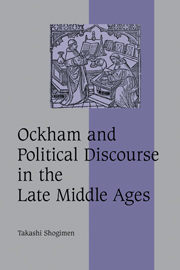Book contents
- Frontmatter
- Contents
- Preface
- List of abbreviations
- INTRODUCTION
- 1 THE POVERTY CONTROVERSY
- 2 A GENERAL THEORY OF HERESY
- 3 THE PROBLEM OF PAPAL HERESY
- 4 PAPAL PLENITUDO POTESTATIS
- 5 PETRINE PRIMACY
- 6 THE DEFENCE OF HUMAN FREEDOM
- Appendix: Ockham's ‘Dialogus’ and Marsilius' ‘Defensor pacis’
- Bibliography
- Index
- Cambridge Studies in Medieval Life and Thought Fourth series
6 - THE DEFENCE OF HUMAN FREEDOM
Published online by Cambridge University Press: 23 July 2009
- Frontmatter
- Contents
- Preface
- List of abbreviations
- INTRODUCTION
- 1 THE POVERTY CONTROVERSY
- 2 A GENERAL THEORY OF HERESY
- 3 THE PROBLEM OF PAPAL HERESY
- 4 PAPAL PLENITUDO POTESTATIS
- 5 PETRINE PRIMACY
- 6 THE DEFENCE OF HUMAN FREEDOM
- Appendix: Ockham's ‘Dialogus’ and Marsilius' ‘Defensor pacis’
- Bibliography
- Index
- Cambridge Studies in Medieval Life and Thought Fourth series
Summary
The preceding chapters have shown that Ockham in his anti-papal polemical activities was a theologian ideologically opposed to canonists. In Ockham's view the canonists' intervention in doctrinal matters was unjustified. Ockham's theological independence from the Franciscan (more specifically, the Michaelist) ideology allowed him to delve into more ‘general’ questions of heresy, with a focus on papal heresy. Henceforth, Ockham's political writings were to be framed by his general theory of heresy. In his earlier polemical activities, this theory of heresy was applied to demonstrate that contemporary popes were heretics whilst, in the later stages, the concept of heresy itself drove him to an exegesis of the scriptural texts relating to issues surrounding the nature of papal power, which had been misconstrued in a juristic fashion. Ockham's discourse on papal government can be characterised as a theologian's logical search for biblical truths concerning the power of St Peter and his successors. Viewed as a theologian's endeavour to combat juristic misinterpretations of scriptural texts, Ockham's change of polemical interests emerges as coherent and consistent.
We have therefore focused almost exclusively on Ockham's ecclesiological discussions and have left out one important feature of Ockham's polemics: the discourse on secular politics. Previous scholarship has never overlooked Ockham's discussion of secular power; indeed, Ockham was once described as a defender of the empire. More recently, his pragmatic ‘dualism’ or ‘separatism’ between the spiritual and temporal powers has been emphasised.
- Type
- Chapter
- Information
- Ockham and Political Discourse in the Late Middle Ages , pp. 232 - 262Publisher: Cambridge University PressPrint publication year: 2007

